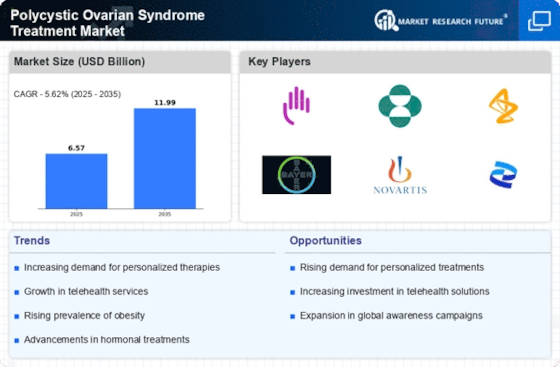Growing Focus on Women's Health
The increasing focus on women's health issues is propelling the Polycystic Ovarian Syndrome Treatment Market forward. Policymakers and healthcare providers are recognizing the importance of addressing conditions that disproportionately affect women, such as PCOS. This shift in focus is leading to increased funding for research and development of new treatment options. Moreover, healthcare systems are beginning to prioritize women's health in their service offerings, which may result in improved access to care for PCOS patients. As a result, the market is expected to benefit from enhanced support and resources dedicated to women's health initiatives.
Increased Awareness and Education
The rise in awareness and education regarding Polycystic Ovarian Syndrome is a crucial driver for the Polycystic Ovarian Syndrome Treatment Market. Educational campaigns by healthcare organizations and advocacy groups are informing women about the symptoms and potential health risks associated with PCOS. This heightened awareness encourages women to seek medical advice and treatment, thereby increasing the demand for therapeutic options. Additionally, educational initiatives are fostering a better understanding of lifestyle modifications that can complement medical treatments, such as diet and exercise. As more women become informed about PCOS, the market is likely to experience sustained growth.
Advancements in Medical Technology
Technological advancements in medical devices and treatment methodologies are significantly influencing the Polycystic Ovarian Syndrome Treatment Market. Innovations such as telemedicine, wearable health technology, and advanced diagnostic tools are enhancing patient care and treatment outcomes. For instance, the integration of artificial intelligence in diagnostic processes allows for more accurate identification of PCOS, leading to timely interventions. Furthermore, the development of new pharmacological agents and minimally invasive surgical techniques is expanding the treatment options available to patients. As these technologies continue to evolve, they are expected to drive market growth by improving patient engagement and adherence to treatment protocols.
Rising Demand for Personalized Medicine
The trend towards personalized medicine is emerging as a significant driver in the Polycystic Ovarian Syndrome Treatment Market. Patients are increasingly seeking tailored treatment plans that consider their unique genetic, environmental, and lifestyle factors. This shift is prompting healthcare providers to adopt more individualized approaches to managing PCOS, which may include customized medication regimens and lifestyle interventions. The growing body of research supporting personalized treatment strategies is likely to enhance patient outcomes and satisfaction, thereby driving market growth. As the healthcare landscape evolves, the demand for personalized solutions in PCOS treatment is expected to rise.
Rising Prevalence of Polycystic Ovarian Syndrome
The increasing prevalence of Polycystic Ovarian Syndrome (PCOS) is a primary driver for the Polycystic Ovarian Syndrome Treatment Market. It is estimated that approximately 6 to 12% of women of reproductive age are affected by this condition, leading to a growing demand for effective treatment options. As awareness of PCOS rises, more women seek medical assistance, thereby expanding the market. The condition is often associated with various comorbidities, including obesity and diabetes, which further complicate treatment and necessitate a multifaceted approach. This growing patient population is likely to stimulate innovation in treatment modalities, including pharmacological and non-pharmacological interventions, thereby enhancing the overall market landscape.


















